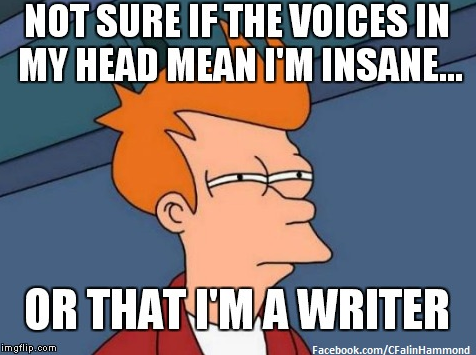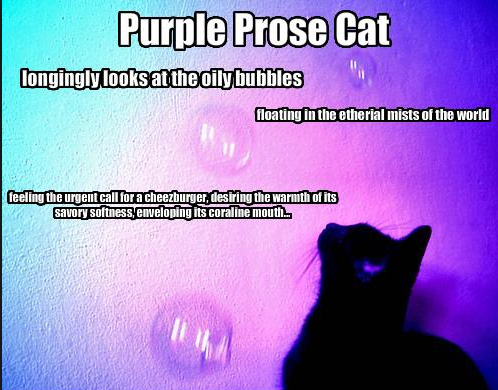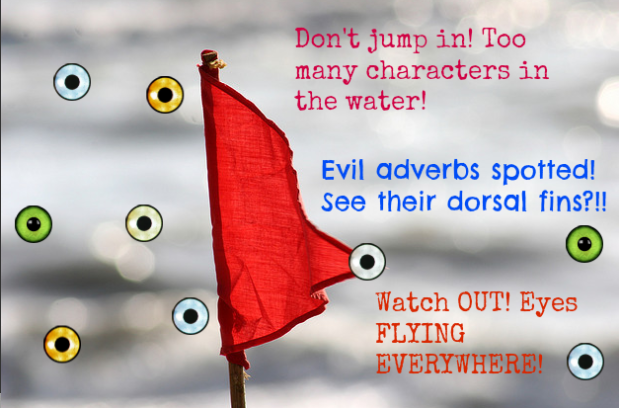
Over my career I have literally edited thousands of works, most of them written by emerging writers. My greatest frustration always was (and still is) when I couldn’t even GET to critiquing the deeper story elements because I was too distracted by these all too common oopses.
Good editors are NOT cheap. There are also many editors who charge by the hour. If they’re spending their time fixing oopses you could’ve easily repaired yourself? You’re burning cash and time. Yet, correct these problems, and editors can more easily get to the MEAT of your novel. This means you will spend less money and get far higher value.
#1 The Brutal Truth about Adverbs, Metaphors and Similes
I have never met an adverb, simile, or metaphor I didn’t LOVE. I totally dig description, but it can present problems.
First of all, adverbs are not ALL evil. Redundant adverbs are evil. If someone shouts loudly? How else are they going to shout? Whispering quietly? Really? O_o Ah, but if they whisper seductively? The adverb seductively gives us a quality to the whisper that isn’t already implied by the verb.
Check your work for adverbs and kill the redundant ones. Kill them. Dead.
Metaphors and similes are awesome, but need to be used sparingly. Yes, in school, our teachers or professors didn’t ding us for using 42 metaphors in 5 pages, but their job was to teach us how to properly use a metaphor or simile, NOT prepare us for commercial publication as professional novelists.

When we use too much of this verbal glitter, we can create what’s called “purple prose.” This glitter, while sparkly, can pull the reader out of the story or even confuse the reader. A while back, I edited a winner’s 20 page entry. The story began on a whitewater river and the rafters were careening toward a “rock coffee table.”
Huh?
Oh, the boulder is squarish shaped!
Thing is, the metaphor made me stop to figure out what image the author was trying to create. If the rafters had merely been careening toward a giant flat rock? Not as pretty but I could have remained in the story without trying to figure out how the hell furniture ended up in the river.
I’ve read some great books, but as an editor, I might have cut some of the metaphors. Why? Because the author might have a metaphor SO GOOD I wanted to highlight it and commit it to memory…but it was bogged down by the other four metaphors and three similes on the same page. The other metaphors/similes added nothing…unless one counts distraction.
Go through your pages and highlight metaphors and similes. Pick THE BEST and CUT THE REST. Look for confusing metaphors, like rock furniture in the middle of a river.
#2 Stage Direction
She reached out her arm to open the door.
Okay, unless she has mind powers and telekinesis, do we need the direction?
He turned to go down the next street.
He picked up the oars and pulled a few more strokes, eager to get to his favorite fishing spot.
We “get” he’d have to pick up the oars to row his boat, or that is a seriously cool trick.
Be active. Characters can “brush hair out of their face” “open doors” and even slap people without you telling us they reached out an arm or hand to do this. We are smart. Really.
#3 Painful and Alien Movement of Body Parts…
Her eyes flew to the other end of the restaurant.
His head followed her across the room.
All I have to say is… “Ouch.”
Make sure your character keeps all body parts attached. Her gaze can follow a person and so can her stare, but if her eyes follow? The carpet gets them fuzzy with dust bunnies and then they don’t slide back in her sockets as easily.

#4 Too Much Physiology…
Her heart pounded. Her heart hammered. Her pulse beat in her head. Her breath came in choking sobs.
After a page of this? I need a nap. After two pages? I need a drink. We can only take so much heart pounding, thrumming, hammering before we just get worn out. That and I read a lot of entries where the character has her heart hammering so much, I am waiting for her to slip into cardiac arrest at any moment. Ease up on the physiology. Less is often more.
Get a copy of Angela Ackerman and Becca Puglisi’s Emotion Thesaurus to help you vary physiology. Also, if someone’s heart is pounding, that’s okay. We assume until they are out of danger it’s still pounding. No need to remind us.
Really.
#5 Backing Into the Sentence/Passive Voice
In an effort to break up and vary sentence structure, many writers will craft sentences like this:
With the months of stress pressing down on her head, Jessie started ironing the restaurant tablecloths with a fury.
Problem? Passive action. When we use the word “down” then “on” is redundant. Either she is ironing or not ironing. “Started” is overused and makes sloppy writing. That actually goes back to the whole “stage direction” thing.
Active:
Jessie ironed the restaurant tablecloths with a fury, months of stress pressing on her shoulders.
The door was kicked in by the police.
Police kicked in the door.
If you go through your pages and see WAS clusters? That’s a HUGE hint that passive voice has infected your story.
#6 Almost ALWAYS Use “Said” as a Tag
“You are such a jerk,” she laughed.
A character can’t “laugh” something. They can’t “spit” “snarl” “grouse” words. They can SAY and ever so often they can ASK. Said used properly becomes white noise.
NOTE: Use said as a tag…just don’t get crazy. If you beat it up it gets distracting and annoying.
But again, used properly readers don’t generally “see” it. It keeps them in the story and cooking along. If we want to add things like laughing, griping, complaining, then fine. It just shouldn’t be the tag.
“You are such a jerk.” She laughed as she flicked brownie batter onto Fabio’s white shirt.
Notice how sentences like the one above also keep us from beating said to death.
I swear the funniest instance of bizarre tags was a new writer who just would NOT listen to me and she insisted on using all these crazy@$$ tags. So instead of exclaimed when her character yelled something she tagged with, he ejaculated.
*Editor Kristen falls over laughing*

Okay y’all ALL sniggered at that one. So yeah be creative just not in the tags, ya dig? 😉
There you go, SIX easy tips for self-editing. We all make these mistakes and that’s why God invented revision (that and to punish the unfaithful). If you can get rid of these common offenders on your own, then good editors can focus on the deeper aspects of your fiction.
Have you had to ruthlessly slay your favorite metaphors? Are you a recovering adverb-addict? What are some other self-editing guidelines you use to keep your prose clean and effective?
I LOVE hearing from you!
And to prove it and show my love, for the month of FEBRUARY, everyone who leaves a comment I will put your name in a hat. If you comment and link back to my blog on your blog, you get your name in the hat twice. What do you win? The unvarnished truth from yours truly.
I will pick a winner once a month and it will be a critique of the first 20 pages of your novel, or your query letter, or your synopsis (5 pages or less).
SIGN UP NOW FOR MY UPCOMING CLASSES!!!
Remember that ALL CLASSES come with a FREE RECORDING so you can listen over and over. So even if you can’t make it in person? No excuses!
All you need is an internet connection!








71 comments
4 pings
Skip to comment form
Reblogged this on Writing and Musing and commented:
Great advice! I’ll definitely be looking at these when I go back to The Dreams later this year.
Thanks for the tips! I listened on the “said” part, so no “ejaculating”.
I’ve been ruthless on the passive voice and adverbs, but I need to look into the sentence structure passive voice. Of that, I may be Guilty!
Thank you! I preach these tips, especially when a budget-strapped author comes to me for editing, trying to show writers how they can do substantial ‘clean-up’. It’s so simple – and takes much less time than expected – just go step-by-step, 1 through 6 – and voila! nice, trimmed up manuscript!
Hi Kristen,
I have the “Emotion Thesaurus” and use it religiously to stop myself from telling and not showing. Is it over the top to use more than one emotion description. For example, to show the person is embarrassed “…he shifted in his seat while looking down at his hands.” Great post and great advice.
Author
Nah I dig it. Just be careful you don’t fall into a PATTERN of it because that is what gets distracting like overusing said. Used properly it is invisible but enough to make an obvious pattern and it give us an eye twitch.
Thanks…My over used word is ‘that or which’. I’m always having to go back and correct it.
I would love for you to edit some pages, with commentary, on your blog. Seeing an edit of a WIP through the eyes of editors is my fave thing and very educational.
This post made me laugh while my arm slowly, lovingly reached for my cup of hot, steamy coffee! 😀
Author
LOL. I should take a page from my first novel #TheHorror and shred it for y’all to see.
Great idea. I second this suggestion.
As always, insightful and informative. It helps to be Lamb-ified!
I’m reading a recent Pulitzer Prize winning novel and it’s stuffed with metaphor. I started checking off all the ‘as ifs’ and ‘as thoughs’. Maybe it’s just the writer in me, picking up on this.
TFW you *just* finished editing a trilogy you’ve been working on for years — including self-editing — and once done, coming upon this blog and breathing a sigh of relief and amusement that you did it correctly.
Thanks for sharing! 😀
Ach! Stage direction — my worst enemy. I have a special revision step just to eliminate these! And, *snigger*, you said “ejaculated”. Heh heh. Hehhehheh. 🙂 (Yes, I’m twelve. What can I say?)
Reblogged this on authorkdrose.
Reblogged this on North of Andover.
Ahhh….metaphors. They are the sweet crack to my writing crack pipe. Rehab has been hell.
Excellent and timely advice.
Adverbs trip me up all the time, even after I think I’ve killed the redundancy. Dialogue tags trick me once in awhile, but I have changed for the better…most of the time. 🙂
Great tips! Thanks for sharing! These are especially helpful for me now, because I am revising my novel.
Excellent advice! Sharing…
Reblogged this on Charity Rau and commented:
Some great tips for editing your work!
Reblogged this on Wind Eggs and commented:
Kristen Lamb offers a few insightful, and spot-on tips to help you edit your prose. (Hint: “His eyes flew across the room” is not a metaphor. It’s physically impossible.)
Good stuff as always, Kristen. I shall recommit to relentlessly, ruthlessly and fatally slaying regrettably redundant adverbs!
Thanks for the always excellent advice. I’ve recently been experimenting with two editing “packages”, Grammarly and Pro Writing Aid. Both highlight the issues you mention in the post, infuriatingly well. Pro Writing Aid digs out so many other evils that I feel like I’m in Editing Hell.
Use metaphors and similes sparingly — shout if from the rooftops
I have a problem with stage directions. 🙁 Or maybe they have a problem with me…and that’s why they keep showing up.
I hate typos.
Loved this post! #3 made me laugh out loud! However, I have to address the “ejaculation” issue. Around the turn of the 20th century, “ejaculated” was in fairly common use as a synonym for “exclaimed,” especially for those who used Oxford English rather than American English. It sounds funny to us now but was considered a legitimate use of the word at one time. Check this out:
https://www.quora.com/When-did-writers-stop-using-the-word-ejaculated-as-a-term-for-exclaimed
Reblogged this on Teresa Schulz and commented:
Such useful tips, thank you Kristen
Spot on advice. I recently edited a couple of stories that had many of these faults (and more). One was so incoherent that I actually told them how to re-approach the story, wrote a new first paragraph and suggested they pursued it that way, throwing out what they’d written. Curiously, the author was quite lucid in their written English when not trying to write a story.
Apropos ‘ejaculated’ as a dialogue tag – it was absolutely in use in the UK during the early-mid twentieth century, as Holly points out, meaning ‘exclaimed’. Captain W. E. Johns used it a LOT in his Biggles series, which the Monty Python team ruthlessly lampooned a little later (‘Biggles Flies Undone’, etc). Well worth hunting out, I think it was in their ‘Papperbok’, and don’t read it while drinking coffee. 🙂
From one editor to another…
EXCELLENT ADVICE!!!
I shared this in Roane’s author group.
“Jessie IRONED the restaurant tablecloths with a fury, months of stress PRESSING on her shoulders.” Wow, way to wordsmith, girl! 🙂 This is an excellent blog post. I run into these issues all the time. I’d like to add word repetition to your list, which can be very distracting when used in close proximity. (I worked on one manuscript where the word “it” was used over 200 times in the first chapter.) Another issue that slows me down is awkward prose, where you stumble and have to read the sentence over several times to ferret out what the author is trying to say. I’d love to see you do a blog post on helping an author recognize and improve awkward or clunky prose in her manuscript. (One hint: try reading your manuscript out loud and notice where you stumble over the words or need to take more than one breath while reading a sentence.) Thank you for another great post!
It’s gray and rainy. I needed the laugh. Thanks.
And the fact you remember the rock coffee table? *Hangs head in shame*
Author
Was that you? LOL. I forgot who it was! I remembered liking the story but was all WTH is with furniture in the river?
Oh you ripped the story pretty good, too. Not enough empathy for the characters before I sent them into the fray. Yeah, it was exactly the kick in the pants I needed to dig deeper when writing beginnings.
But, hey, I’m memorable. Bad memorable maybe, but memorable nonetheless 🙂
Perfect timing, Kristen.
I’m teaching my self-pub intro workshop this month, and I’ve just added this blog to the roster for “extra-reading.” (Lesson one of self-pub, is about editing of course!)
Reblogged this on Mystery and Romance.
Love your blog, like the black and white and red all over head of a sunburnt zebra loves a hat, its fiery haunches burning, yet resting peacefully under a glistening, rain-drenched, wet green elm in a lonely pasture on a grassy knoll. With a rainbow.
Author
BWA HA HA HA HA HA HA! LOVE! We need a Purple Prose Smack Down.
Sounds like fun! ?
I am currently editing, and being amazed at how often I’ve written out all the ‘blocking’ for how a person moves from a to b in order to do c, as though they’re some sort of marionette that has to be moved one limb at a time. Having fun with my big red (figurative) scissors!
Adverbs are fun to play with, but instead of loading up on adverbs, we should remember to choose the right verb. Using a strong, appropriate verb can eliminate the need for an adverb or allow your chosen adverb to be more impactful.
Brilliant. Just what I needed to read today. I’ve recently finished a novel and am reaching out to beta readers while pondering what else I can do to prepare the MS before hunting down an editor. Now, thanks to you, I know exactly what kind of things to look for. Thank you!
Reblogged this on ugiridharaprasad.
Reblogged this on dave94015 and commented:
Guys! If you write, here are 6 common mistakes you can fix!
I’m glad you picked the top 6 common mistakes in writing…easy to remember!
Two things – thanks for making me laugh! And thanks for pointing out the commonsense way to use adverbs. Such a relief. 🙂
Reblogged this on Don Massenzio's Blog and commented:
Here is a very helpful post from Kristen Lamb’s blog. If you’re not following this blog, you should consider it.
Hi Kirsten! Thank you for all the info you share on your blog. I really need it. I’m horrible with purple prose. Oh, and I shared this blog post on my author page on FB and also on Twitter. Thank you!! https://www.facebook.com/AuthorMelissaEBeckwith/
Just took a break from editing my manuscript (no kidding!) to read this and tweet it. Thanks!
You make this sound so simple Kristen! I can see my work is cut out for me. Thanks for all your advice! ~Elle
Some more for your collection: “He shrugged his shoulders.” “She had an angry expression on her face.” “It’s raining outside.” And this from our 6th grade teacher that still makes us LOL: “She sat with her head in her hands and her eyes on the floor.”
Thank you, Kristin. This is valuable advice. Love your sense of humor. I look forward to reading more of your posts.
Ha! Last week, I blogged about how tools can help with these awesome noob mistakes (which little Alvin suffered through like the rest of ’em).
The first comment? “I wish I would have read this 10 years ago!”
My comment to you: “I wish *I* would have read this 5 years go!” 😉
¡Ojo! A hidden danger lurks in the purification process of exorcising yourself from all the fun: You can easily lose your voice.
It happened to me, and you can read about it here:
https://alvinchardon.com/2017/01/28/its-dangerous-to-go-alone-take-this
I’m reblogging you so my readers take heed…
Reblogged this on Alvin's House of Words and commented:
Kristin, professional editor, offers similar advice to my post on quality writing and tools:
https://alvinchardon.com/2017/01/28/its-dangerous-to-go-alone-take-this/
I’m not alone in the writing journey. And neither are you. Take heed, new recruits.
Love these tips. I joined my first writing group 18 months ago and at the time I was probably guilty of all of the above. I have hacked away and am now down to a couple — passive voice still creeps in there and the purple prose surfaces in my first drafts (but that’s what first drafts are for, right?)
It seems like going back through one’s draft looking for each flaw, in turn, is an overwhelming task, but it’s really the only way to edit effectively. I would also like to add that repetition of words and phrases is also one of my weaknesses – and my only solution is reading my work aloud. I have found I may miss these when reading to myself, but the spoken word will “red flag” every redundancy.
Thank you for yet another great post!
Have you been reading my WIP? I have been addressing most of these as I go through the revision process. You cost some editor a healthy living off my WIP.
Reblogged this on Kat's Writing Runway and commented:
Super helpful advice. Six self-editing tips for your manuscript by Kristen Lamb. #6 had me in stiches. I purchased the “Emotion Thesaurus” and refer to it all the time. Another awesome post!
Passive vice, along with mixing tenses, is my worst offense when I’m writing. I’m printing this out and keeping it at my desk to remind me not to do it!
I am wondering what your take on Ingram Spark and their offerings on self-publishing are? I have a couple of novels partly done, have published a couple of poems and have a short story ready to go somewhere. It sounds like they give you a lot of help, but is it worthwhile help.
I read your blog and have kept all of them since last year. No blog of my own yet. I don’t even understand facebook. I am not a youngster but an old lady.
Thanks, Lenore Brashear
Reblogged this on Erotic Vampire and commented:
I’ve re-posted this before. It’s worth re-posting. Thank you Kristen. As always you bring us so much value.
You are seriously funny…and use your humor to coach in a constructive way, thanks 🙂
Author
It makes it fun and it helps to laugh at the stupid stuff because we have ALL done it, lol. Thanks!
Reblogged this on DyNaMik Records.
Such an interesting post, I can see when I do this with my own work and its not pretty. Trying to get in the habit of working my ass off, putting it away then revisiting it at a later date.Thank you
Your humor and sizzling examples always keep me reading. I think the writing world needs about 500 iterations of this message. I did my part with a similar post yesterday on slightly different topics.
My new writing partner: ProWriter. I am amazed at what it picks up. Works great in conjunction with other editing pricesses to analyze a manuscript in twenty-two different areas. I has helped sharpen my writing and clean up some errors before I send it onto the eest of my team. ?
Thanks, Kristen! I definitely noticed my own excessive use of “began to” and “started to” and worked that one out. Also now sensing I use “just” and “actually” too much. I’m a beginning writer and ‘don’t know what I don’t know’ so this is extremely helpful. I have what’s probably a weird system of hand-writing the first draft – did extensive report writing back when all I could use was a pencil – then doing edits when I type it in – so I’m definitely listening to you. Thanks, again!
My sister gave me the Emotion Thesaurus for Christmas this year. BEST SISTER EVER! I love it.
I tend to slip into passive voice too often and have to go back and change it. I also have my characters do everything “for a moment.” Seriously I could do a find and replace just getting rid of “for a moment” and lose 1% of my manuscript. LOL
Great advice! Thanks. Now I’m off to hunt metaphors and similes.
Ann
Love, love, love – okay, here’s another one – LOVE this blog and this post! Thanks. 6 Easy Ways rattled my cage, kicked my can, suitably stirred up the fires of my ever-expanding imagination, tickled my fancy… Okay, I’ll stop now. Thanks for this reminder of something that is easy to forget in the excitement (and drudgery) of writing.
Engaging and practical. Thx!
Ha ha! Educational and VERY entertaining, as always.
[…] Source: Save Money on Professional Edits—6 Easy Ways to Clean Up Your Own Manuscript […]
[…] Money on Professional Edits – 6 Easy Ways to Clean Up Your Own Manuscript https://warriorwriters.wordpress.com/2017/02/03/save-money-on-professional-edits-6-easy-ways-to-clea… Any advice by the great Kristen Lamb is worth reading – but she’s right, this article could […]
[…] https://warriorwriters.wordpress.com/2017/02/03/save-money-on-professional-edits-6-easy-ways-to-clea… The dangers of too many similes and metaphors: purple prose. […]
[…] After drafting comes revision and editing. Naomi Hughes reveals the top 3 scene issues she encounters, and Kristen Lamb has 6 easy ways to clean up your own manuscript. […]